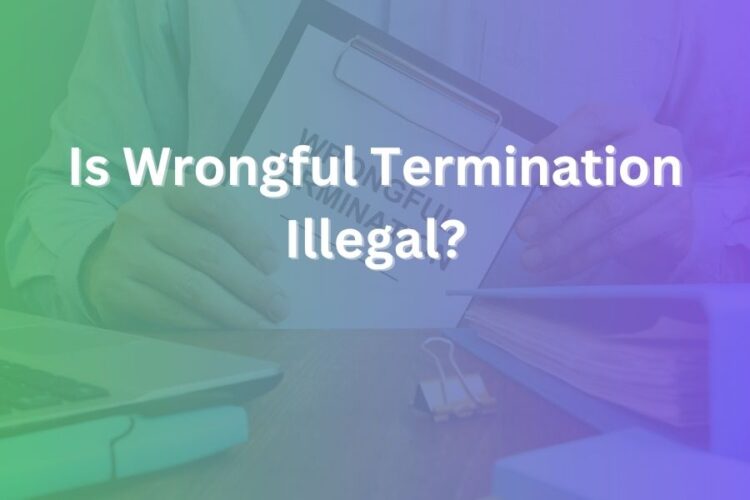As someone invested in your career and livelihood, you’ve likely asked yourself: is my dismissal truly illegal, or just unpleasant? Understanding how workplace rights intersect with termination laws in the U.S. can feel complex.
In this article you’ll learn what wrongful termination really means, when it’s illegal, how the “at-will” doctrine applies, the key exceptions that save you, and what steps you can take if you believe you were wrongfully fired.
What Is Wrongful Termination?
Wrongful termination occurs when your employer fires you for a reason that violates a contract, statute, or public policy. If you were dismissed in such a way, you may have legal grounds to challenge the termination.
Most U.S. jobs are covered by “at-will” employment, meaning either you or your employer can end the job relationship at virtually any time, for almost any reason, or for no reason at all. But this broad power doesn’t give employers free rein to break laws. They cannot legally fire you for reasons that federal or state law forbids, or in violation of a binding employment agreement.
At-Will Employment: The Default Rule
In nearly every U.S. state (except Montana, which has certain exceptions), the default employment relationship is at-will. That means you have minimal job security in the sense that your employer may let you go without cause, notice, or warning — unless you have a contract stating otherwise.
This fact often surprises people who believe they can’t just be fired “without reason.” In reality, so long as the reason is lawful (or no reason is given), the termination may not qualify as wrongful.
When Is Termination Illegal? Key Exceptions to At-Will
Just because your employer fired you doesn’t mean it was illegal. To have a claim for wrongful termination, one of several legal exceptions must apply.
- Discrimination and Protected Classes
Your employer cannot fire you because of your race, sex (including pregnancy), religion, national origin, age (40 +), disability, or other similar protected characteristics. If the termination involved discrimination of this kind, it is illegal. - Retaliation and Protected Activity
If you engage in protected activity — for example, reporting harassment, complaining about wage violations, refusing to commit an illegal act, or blowing the whistle on safety violations — your employer cannot legally fire you in retaliation. - Violating Public Policy
Employers cannot legally fire someone for reasons that violate established public policy, such as serving on a jury, filing a workers’ compensation claim, refusing to commit a crime, or exercising statutory rights like taking certain family or medical leave. - Breach of Contract or Implied Agreement
If you had an employment contract (written or implied) that the company would only fire you “for cause,” or you relied on promises or policies that created a genuine expectation of job security, then firing you outside those terms may be wrongful. - Good Faith and Fair Dealing (in some states)
In a minority of states, you’re protected if the employer terminates you in bad faith or deceitfully—though this logic varies widely and is recognized only in certain jurisdictions.
How to Tell If Your Termination Was Illegal
To determine whether your termination qualifies as wrongful, ask yourself:
- Was I let go because I belong to a protected class or because I exercised a legal right?
- Was I fired right after engaging in protected activity (like whistle-blowing or complaining about discrimination)?
- Did my employer breach an employment contract, promises in a handbook, or company policy that created an expectation of job security?
- Did the employer fire me for refusing to do something illegal or unethical?
- Was the termination inconsistent with the employer’s usual practices (for example, ignoring the normal disciplinary steps when required)?
If the answer to any of those is “yes,” you may have legal grounds to pursue a claim.
Recent Data and Trends
Recent figures show that over 64 % of all employment discrimination complaints filed with the U.S. Equal Employment Opportunity Commission (EEOC) in recent years included allegations of wrongful discharge or wrongful termination—signaling how common these claims remain. Employers often rely on the at-will doctrine but must still respect underlying statutory protections.
State Variations: Why Where You Work Matters
Because employment laws vary by state, your legal protections will depend in part on state law in addition to federal statutes. Some states afford broader protection than others. For example:
- In states like California and Montana, the implied contract and public-policy exceptions are robust and widely enforced.
- In states with limited exceptions, your only recourse may be through federal discrimination/retaliation laws.
- If you work under a collective bargaining agreement or union contract, “just cause” termination rules often apply.
What You Should Do If You Believe You Were Wrongfully Terminated
Document Everything
Collect key evidence: termination letter, emails, performance reviews, company handbook, any discriminatory remarks, notes on protected activity you engaged in. These records strengthen your case.
Check Deadlines
Statutes of limitation apply for filing claims with government agencies and courts. Waiting too long may forfeit your rights.
Consult an Employment Attorney
A qualified lawyer can evaluate your situation, interpret federal and state laws, and estimate your chances of success. Many offer free consultations.
File Administrative Complaints
Before suing, you often must file a complaint with agencies such as the EEOC or your state’s fair employment practice agency. This is a required step in many discrimination and retaliation cases.
Consider Negotiation or Settlement
Your employer may prefer to settle rather than endure expensive litigation. An attorney can negotiate on your behalf.
Know What You Can Recover
Remedies may include back-pay, reinstatement, front-pay, compensatory and punitive damages, and attorney’s fees—depending on the law you invoke and your employer’s size.
Defenses Employers Commonly Use
Your employer may respond with one or more of the following defenses:
- They terminated you for valid cause (e.g., misconduct, poor performance) or for legitimate business reasons.
- The employer claims at-will employment liberates them to fire you for any reason (provided it’s not illegal).
- They argue you failed to exhaust internal grievance procedures or statutory administrative claims.
- They contend you don’t qualify for protections (for example, you weren’t eligible under the Family and Medical Leave Act of 1993 (FMLA)).
Tips to Strengthen Your Position
- Keep a journal of events leading up to your termination: dates, conversations, names of witnesses.
- Save copies of any related documents: handbook, evaluation reports, policy statements, emails.
- Avoid signing a severance agreement without legal review—some waive your right to sue.
- Do not publicly vent about your firing in a way that could hurt your claim or interfere with your ability to return to work.
- Ask questions: Was there a pattern of firings of others like you in protected classes? Did the employer deviate from their usual process?
When You Likely Don’t Have a Claim
If you were let go simply because your employer wanted to restructure, because your performance was consistently below expectations, or the termination aligned with well-documented disciplinary steps and did not involve discrimination, retaliation, or contract breach — then while the firing may feel unfair, it often doesn’t rise to “illegal” wrongful termination. In those scenarios you may not have legal recourse.
Final Thoughts
Yes — wrongful termination can be illegal, but not every firing is. Your right to challenge a termination depends on facts: the reason for firing, whether you exercised protected rights, whether your employer violated a contract or public policy, and which state’s law governs you. You must proactively document, act fast, and seek qualified legal advice when you suspect your termination crossed legal lines.
With more than 30 years of observing workplace and employment law, I’ve seen how strong documentation and speedy action often make the difference between a claim that succeeds and one that falls short. Take your next steps wisely.










